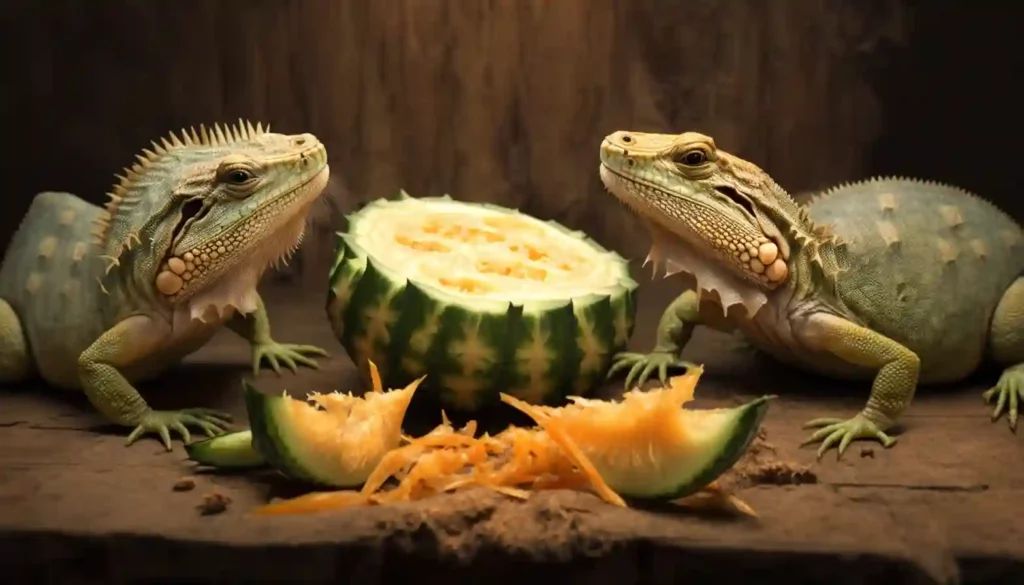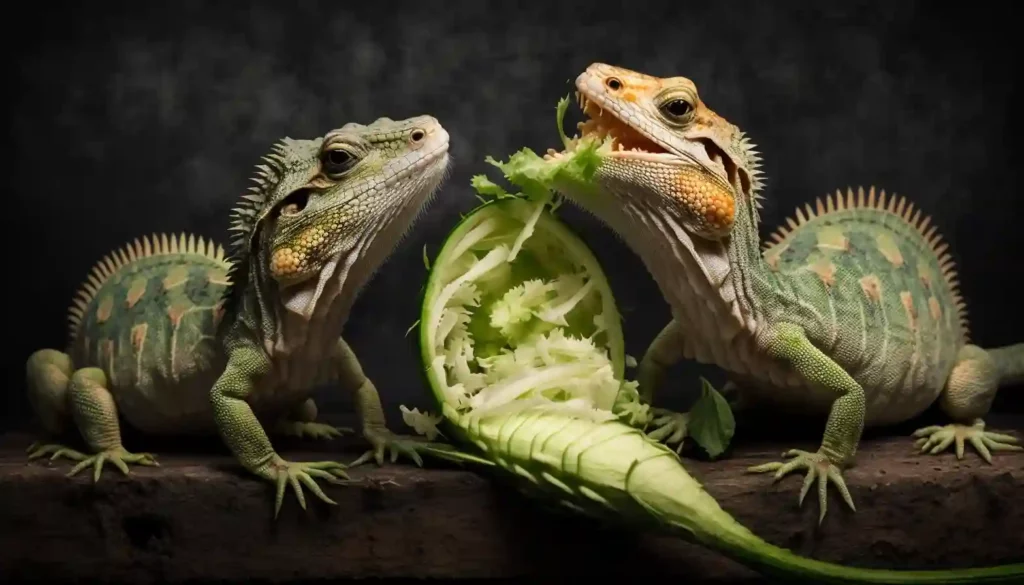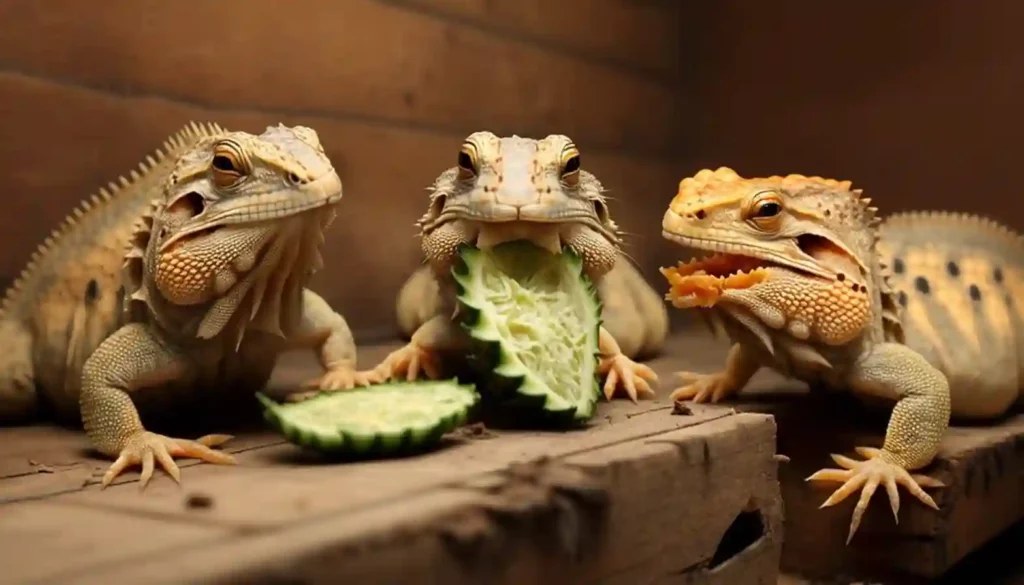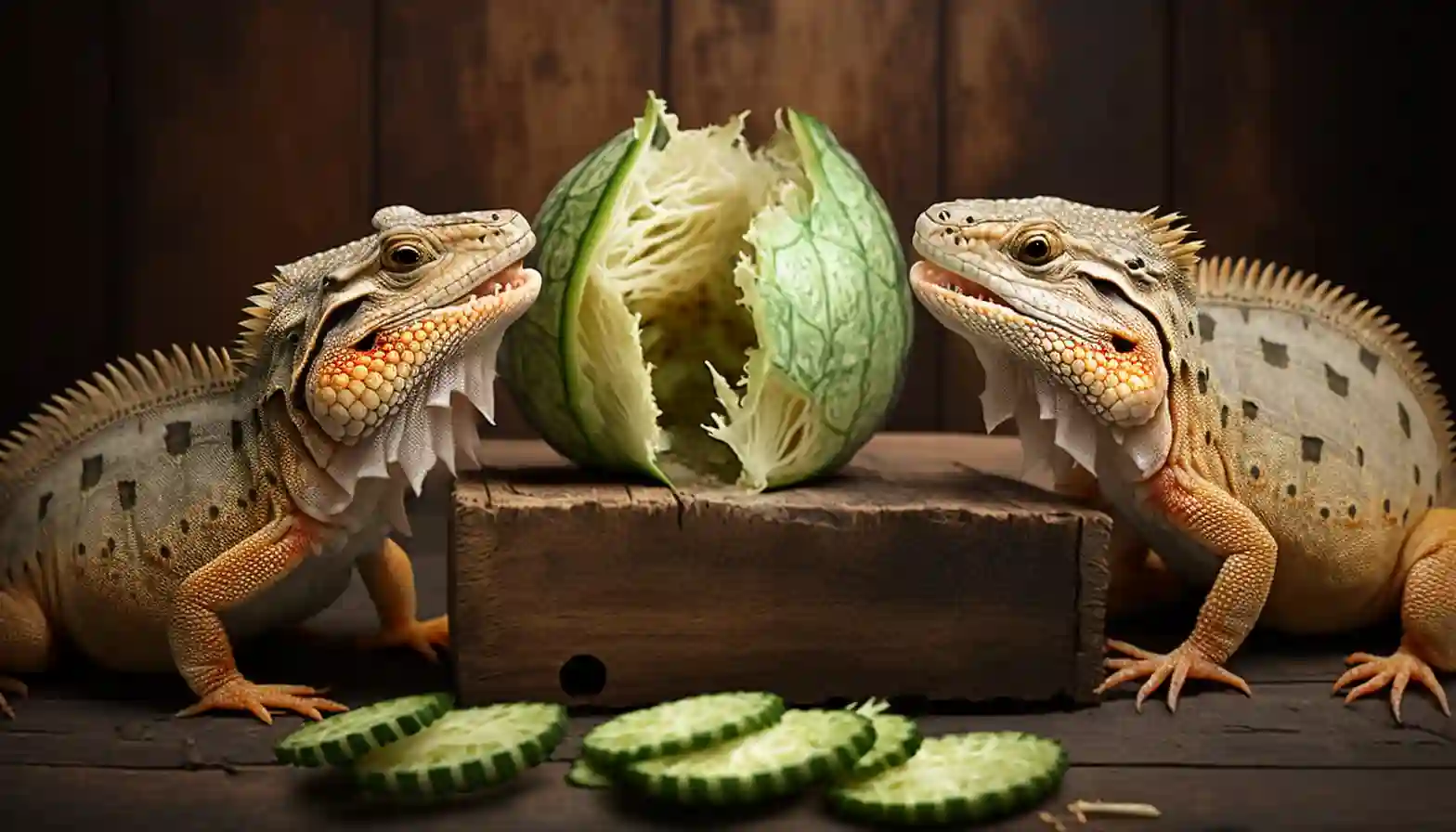Yes, bearded dragons can eat zucchini as an occasional snack. It is recommended to feed them raw zucchini instead of cooked since cooking depletes the already relatively low nutritional value.
Zucchini leaves, stalks, and flowers are all edible for bearded dragons, but they should not eat the seeds as they can cause choking and have no nutritional value.
It is highly recommended to feed zucchini to bearded dragons only occasionally as a treat.
Potential Benefits Of Zucchini

Zucchini can be a safe and nutritious addition to a bearded dragon’s diet, but it should be fed in moderation and as part of a balanced diet. Here are some potential benefits of feeding zucchini to bearded dragons:
- Hydration: Zucchini has a high water content, which can help keep bearded dragons hydrated.
- Vitamins and Minerals: Zucchini is a good source of vitamins and minerals, including calcium, potassium, and vitamin C. These nutrients are important for the overall health and well-being of bearded dragons.
- Fiber: Zucchini contains dietary fiber, which can aid in digestion and promote a healthy digestive system.
It’s important to note that while zucchini can be beneficial for bearded dragons, it should not be the sole or primary food in their diet.
Bearded dragons require a varied diet that includes a mix of vegetables, fruits, and insects to ensure they receive all the necessary nutrients.
Additionally, it’s recommended to feed zucchini in small, bite-sized pieces and avoid feeding cooked zucchini, as it may not provide the same nutritional benefits as raw zucchini.
As always, it’s best to consult with a reptile veterinarian or a knowledgeable exotic pet specialist for specific dietary recommendations for your bearded dragon.
Potential Risks Of Eating Zucchini
Zucchini is safe for bearded dragons to eat, but it is not the best option when it comes to nutritional value and health risks.
While it is safe to feed zucchini to bearded dragons once a week without any major health concerns, feeding excess amounts of this vegetable can cause health issues. The potential risks of eating zucchini for bearded dragons are:
- Phosphorus: Zucchini has quite a bit of phosphorus, which can cause health issues if bearded dragons eat too much of it. Phosphorus binds with calcium, which can lead to calcium deficiency and metabolic bone disease.
- Overhydration: Feeding excess amounts of zucchini can lead to overhydration, which can cause diarrhea and other digestive problems.
Therefore, it is recommended to feed zucchini to bearded dragons in moderation and as part of a balanced diet that includes other vegetables high in calcium and low in phosphorus.
Proper Preparation For Feeding Zucchini To Bearded Dragons

When feeding zucchini to bearded dragons, it is important to consider their nutritional needs and potential health risks. Here are some proper preparations for feeding zucchini to bearded dragons based on the search results:
- Frequency: Zucchini can be included as part of a balanced diet for bearded dragons, but it should not be fed too frequently. Most sources recommend feeding zucchini once a week. Some sources suggest limiting zucchini to once a month if the bearded dragon is already consuming other foods with low calcium levels or high phosphorus levels.
- Raw vs. Cooked: Bearded dragons can eat raw zucchini, and there is no need to cook it for them. However, if you prefer to serve cooked zucchini, it is not necessary for their nutritional needs.
- Portion Size: Bearded dragons have small stomachs, so it is important to limit the amount of zucchini they consume. The recommended portion size is a few ounces.
- Variety: Zucchini should be served as part of a varied diet. It is important to offer a range of vegetables and other food items to ensure that the bearded dragon receives all the necessary nutrients.
Remember to always wash the zucchini thoroughly before feeding it to your bearded dragon to remove any pesticides or contaminants. Additionally, it is recommended to consult with a reptile veterinarian or specialist for specific dietary recommendations for your bearded dragon.
Serving Sizes For Zucchini
Bearded dragons can eat zucchini in moderation, but it should not be a regular part of their diet.
Zucchini is low in calcium, with just 16mg per 100g serving.
Ideally, you should offer no more than 2 or 3 pieces of zucchini to your bearded dragon, and it should be fed with a calcium supplement.
A serving of zucchini should only be given once or twice a month.
Why Can’t Bearded Dragons Eat Zucchini All The Time?

Bearded dragons can eat zucchini, but it is not recommended to feed them this vegetable all the time. Here are some reasons why:
- Nutritional value: Zucchini is not the best option when it comes to nutritional value. While it contains some vitamins and minerals, it is not as nutrient-dense as other vegetables that are better for bearded dragons, such as kale, collard greens, and mustard greens.
- High water content: Zucchini has a high water content, which can cause diarrhea in bearded dragons if they eat too much of it.
- Limited variety: Bearded dragons need a varied diet to get all the nutrients they need, and feeding them zucchini all the time can limit the variety of foods they eat.
Overall, while zucchini is safe for bearded dragons to eat in moderation, it should not be a staple food in their diet.
It is best to feed them a variety of nutrient-dense vegetables, along with insects and other protein sources, to ensure they get all the nutrients they need to stay healthy.
Alternatives To Feeding Zucchini
Bearded dragons can eat a variety of vegetables, including dark green, leafy vegetables, and many colored veggies. Squash, in general, is great for bearded dragons, and they can eat acorn squash a few times a week. Here are some vegetables that are safe for frequent feedings:
- Acorn squash (a few times a week)
- Alfalfa (daily)
- Asparagus (weekly)
- Bell peppers (a few times a week)
- Bok choy (every other week)
- Butternut squash (daily)
- Cactus leaves, also called prickly pear (daily)
In addition to vegetables, fruits are also an important part of bearded dragon diets. They provide many vitamins, minerals, and other nutrients not readily found in other foods. The following fruits are good options to feed your bearded dragon occasionally:
- Apples
- Bananas
- Blueberries
- Grapes
- Strawberries
- Watermelon
It is best to avoid feeding bearded dragons zucchini as there are better alternatives available.
Signs Of Allergy Or Intolerance To Eating Zucchinis
Zucchinis are not harmful to bearded dragons, but they should be fed in moderation as they are not dense in calcium and have quite a bit of phosphorus.
However, bearded dragons can have an allergy or intolerance to zucchinis, which can cause health issues. Signs of an allergy or intolerance to zucchinis in bearded dragons include:
- Diarrhea
- Vomiting
- Itching around the mouth area
- Loss of appetite
- Swelling around the mouth area
It is also important to note that zucchini can sometimes be poisonous, so bearded dragons should always taste any pieces of zucchini they want to eat before being fed.
If you suspect that your bearded dragon is having an allergic reaction to a particular food, such as zucchini, it is best to consult a veterinarian.
